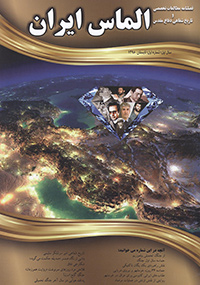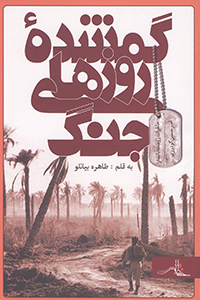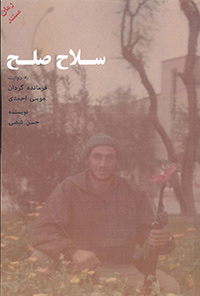Oral History and Sacred Defense Memories in Three Books
Almas of Iran (diamond of Iran)
Mohammadali Fatemi
Translated by Ruhollah Golmoradi
2017-1-29
"The quarterly Journal of "Specialized Studies and Oral History of Sacred Defense: Almas'e Iran", " Gomshodey'e Roozhay'e Jang " and "Selah'e Solh" are three works that now are introduced to readers of http://oral-history.ir. They address events of during the imposed war of Saddam's army against Iran and activities of soldiers in that period, and include details of regarded topics and memories.
Oral History of Army
Publishing the Journal of "Specialized Studies and Oral History of Sacred Defense: Almas'e Iran" started by Islamic Republic of Iran Army's department of Preserving of Relics and Publishing of values of Sacred Defense.
The first issue was released in summer 2016 with managing director Ebrahim Golfam and editor in chief Mohammad Reza Taghizadeh and under supervision of a scientific and editorial group including Mohammad Hossein Dadras, Hossein Valivand'e Zamani, Morvat Azadbakht and Mohsen Moradian, in 228 pages.

The first issue of "Almas'e Iran" starts with two introductions of managing editor and editor in chief and follows with the topics: to learn from the imposed war (Mohsen Radian), epic of first year of the war as honor document of the Army (Gholamhossein Rahimi Movathagh), strategic role of a tactical command: 283rd Armoured Cavalry battalion, 92nd Armored Division at the beginning of the Iraq's imposed war against Iran (Mohammadreza Louny), Navy in Khorramshahr (executors of Navy project in the sacred defense), the eagles of Iran as nightmare for Iraq in Khorramshahr: Air support for 144th Infantry Battalion in Khorramshahr ,a narrative of the Army role in Operation Mersad, oral history of Amir Maj. Gen. Mohammad Salimi (Qasem Akbari Moghaddam), Babaei in view of his wife: Sedighe Hekmat talkss (Roqaye Farsi), Hunter of factionalism: role of Air Force in Operation Mersad (Education board of Air force) , Fallahi, man of days of fate: narrative of comrades (Mir Hossein Miri Mianji), war is treasure: role of individual capacity in environment of military organizations in terms of organizational behavior during the sacred defense (Abbas farrokhi), air defense in the final year of the imposed war relying on Operation Mersad (Reza Jahanfar), introducing books of "Iron Fortress: Narration of Dignity and Authority" and "From Gun to Pen: Memories of Eighty of Sacred Defense".
Preparation and publication of the Journal, as stated by contributors, is a step on the path of studies and oral history of the sacred defense and the resulting indicates that the first step was taken strongly; particularly the impact addresses specially achievement of the Islamic Republic of Iran Army during the sacred defense. As they have increased fund of oral history of the issue.
If contributors of the journal, based on the published issue, interact and interview pundits and scholars in the field of oral history, certainly they would benefit their studies and experiences for the way they have started.

From the West to the south
"Gomshodey'e Roozhay'e Jang: Memories of a Pasdar (Revolutionary Guard) and Fighter Amir Goudarzi" written and edited by Tahereh Bayanloo, is title of a book in Hanzaleh Press that has been published in Office of Assistant of Art and Literature of Alborz's General Administration of Preserving Relics and Publishing of Sacred Defense values and in partnership with Cultural and Social Office of Assistant of Karaj's municipality.
The book with 225 pages was released in 2016 and is set in 19 parts. The last part is devoted to photos associated with memories of the narrator. In his memories text, after telling some information about his origin and his life, he enters in 1983 and his first dispatch to the front. In this year he passes experience of Operation Khyber, then goes to west fronts and again returns South fronts and departs Operation Badr in March 1985. He goes next winter Operations Dawn 8 and 9, summer 1986 Operation Karbala-1 and the same winter Operation Karbala-5 and after these again is dispatched west.
Given this trend, there is the expectation that the narrator to express memories more than what is in the book and in more details, but it is confined what is in the book and the events are passing quickly.

As Narrated by the battalion commander
Another book which was arrived a copy of it to the office of Oral History website is titled "Selah'e Solh: As Narrated by Battalion commander Musa Ahmadi". The book with 458 pages was written by Hassan Feizi and Ammar Ahmadi and published by Savalan Igidlary Publication in 2016 in Ardabil.
The book begins with a narrator talking and ends with photos of him which are related to years of the sacred defense. The narrator talk includes his current communing, according to the political conditions of society.
As narrated by the narrator (who is born in 1959), about first 100 pages of the book is about his hometown and country (Alni in Ardabil) as well as his story and surrounding in the days which made his future. About next 150 pages, the narrator account deals with years after the Islamic Revolution till days of Iraq's imposed war against Iran. In this part, Meshginshahr and the west and Kurdistan region, and local and regional events of protecting Islamic Revolution for its stabilization are highlighted.
Having experienced these days, the narrator is skilled in detecting operational and commanding the corps. As the book continues Operations Khyber and Badr and in the narrator account of the south fronts are considered. Describing commanding of Mehdi Bakeri (who is an unforgettable myth for those Azeris participated in the sacred defense) can be seen in memories of Musa Ahmadi about Operation Badr.
Maybe the publisher or authors, and perhaps both of them called "Selah'e Solh" a documentary novel. Without talking about the title which is disputable, but in most of the book documentation dominates fancies which are for making the text more clear and readable, and as we close end of the book, the dominance is more evident. Moreover, in framework of the combination, the narrator and writers have succeeded to preserve the narrative which includes significant local and regional aspects within the account; in other words, in the narrator memories and based on them, important and even historical events of his environment and life area at related periods of the memories are also seen and read.
Number of Visits: 5864








The latest
Most visited
How to send Imam's announcements to Iran
In the first part, the issue of funds, Hajj Sheikh Nasrallah Khalkhali - who represented most of the religious authorities - was also the representative of Imam. In Najaf, there was a money exchange office that cooperated with the money exchange offices in Tehran. Some of the funds were exchanged through him.Operation Beit al-Moqaddas and Liberation of Khorramshahr
After Operation Fat’h al-Mobin, we traveled to Kermanshah and visited Sar-e-Pol-e-Zahab before heading to Ilam. During Operation Beit al-Moqaddas, the 27th Brigade was still receiving support from the West. We maintained contact with individuals who had previously worked in Area 7 and were now leading the brigade. It was through these connections that I learned about Operation Beit al-Moqaddas.Memoirs of Hujjat al-Islam Reza Motalebi
Hujjat al-Islam Reza Motalebi is a cleric from Isfahan. Before the revolution, he was the imam of the Fallah Mosque – which was later renamed Abuzar Mosque. By his presence and efforts, Abuzar Mosque soon became a base for supporters of the Imam and the revolution. After the victory of the revolution, he played a role in uniting forces and maintaining political vitality in southwest Tehran.The Necessity of Receiving Feedback in Oral History
Whenever we engage in a task, we naturally seek ways to evaluate our performance — to correct shortcomings and enhance strengths. Such refinement is only possible through the feedback we receive from others. Consider, for instance, a basketball player whose shots are consistently accurate; should he begin shooting blindfolded, his success rate would rapidly decline, as he would be deprived of essential feedback from each attempt.

